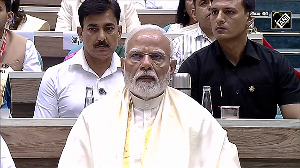For the Congress to be taken seriously, it has to convince those around it that it could actually double its Lok Sabha seat share from the existing 52, and vote-share by a third more from the stagnating 20 per cent in 2014 and 2019, points out N Sathiya Moorthy.

I want to move forward and look to the future -- nothing explains the current predicament of the Congress party in the era of the Udaipur conclave than this revelation of veteran Kapil Sibal, who has since filed his Rajya Sabha nomination with the support of the Samajwadi Party in Uttar Pradesh.
At 73, the former Union minister who had won and lost multiple parliamentary polls as a Congress nominee, was a member of the famed G-23 grouping that wanted the Nehru-Gandhi leadership to rejuvenate the party. And he quit the party, purportedly on May 16, as he anticipated that the Congress won't nominate him for a Rajya Sabha seat.
Under the circumstances, the Congress has nothing much or more to lose than already. The G-23 has to decide if it has to rechristen itself as G-22 or not, but there goes the spirit of the Udaipur Declaration after days of the Chintan Shivir. And there are others of the ilk who want party reforms to reform everyone else other than himself or herself.
Barring Manmohan Singh and A K Antony, no old-age leader has stepped aside, not that they should have waited thus far to do so.
In a way, Rahul Gandhi, despite the 'family' charge, had the decency to step aside as party president, owning up moral responsibility for the party's disastrous showing in elections 2019. Not one other leader at the state or any other level even made unbelievable noises of the kind.
If Kapil Sibal's exit represents the fading end of what used to be a colourful Congress spectrum, that of Hardik Patel in poll-bound Gujarat shows how outsiders and youngsters feel frustrated in the age-old party. Hardik's case is different from the likes of Jyotiraditya Scindia, who were also personal friends of Rahul Gandhi, yet joined the Bharatiya Janata Party, either out of fear for or favour from the ruling party at the Centre.
If Kabil Sibal's exit has already made the Udaipur decision on a 50:50 share in party positions and electoral nominations between the young and the old a laughing matter, even more laughable is the clause dealing with 'one-family-one-party' post. The decision was taken even as the Congress sought and obtained a Rajya Sabha seat from the ruling DMK alliance leader in Tamil Nadu.
The general expectation was/is that the seat would go to former finance minister, veteran P Chidambaram, whose son Karti is already a Lok Sabha member. The DMK may not say it openly, but would be reluctant to part with an Rajya Sabha seat for 'outsiders' like Jairam Ramesh or Pradeep Chakravarthi, who are Tamils by birth but are not known even to the average Congress cadre in the state, leave aside those in the DMK and other alliance partners.
Yes, state Congress president K S Alagiri, once a Chidambaram acolyte, was also said to be in the race, but his nomination would have militated against the one-man one-party rule, even if not reiterated in Udaipur.
There is also no comparison between the past/future parliamentary contributions of PC and Alagiri, who had been a Lok Sabha member for a term (2009-2014) without anyone in his Cuddalore constituency knowing about his contributions, if any.
It may be a coincidence that the CBI chose this time to raid Chidambaram, wife Nalini, son Karti and others. The question before the Congress high command was whether to stand by a veteran for whom the party has not found a replacement or to throw the Udaipur book at him, and thus also avoid further embarrassment on the CBI case front than through all these years, out-of-office.
Worse than all these is the belief and propagation of Rahul Gandhi, repeated at Udaipur, for all the nation to take note for once, that the Congress was the only party capable of taking on and dislodging the BJP at the Centre.
Worse still, he went on to tick off regional parties -- including existing and prospective allies -- saying that they lacked 'ideology'. Maybe he had the AAP in mind, but already the RJD, NCP, JD-S and the rest have taken exception, as was only to be expected.
The Congress might have been the alternative when the BJP rival was drunk with its own 'India Shining!' campaign in 2004. Not today, when the party has no challenger to Prime Minister Narendra Modi's continuing charisma.
Neither has the party found an effective counter-narrative to that of the BJP, nor has an equally effective social media campaign, nor even a safe-seat in one-time family fiefdom in Amethi and Rae Bareili in native Uttar Pradesh.
.
That is not going to happen, especially after Rahul Gandhi's Udaipur declaration that regional parties lack the ideology to counter the BJP.
For the Congress to be taken seriously, it has to convince those around it, starting with the BJP rival, that it could actually double its Lok Sabha seat share from the existing 52, and vote-share by a third more from the stagnating 20 per cent in 2014 and 2019
Today, the Congress needs regional allies than any time in the past. Before swearing by the party's impossible revival, Rahul Gandhi or whoever would have to address the simple question as to how they hope to arrest this trend -- which can only worsen further in 2024, unless the people had already decided to vote against the BJP-NDA and Prime Minister Narendra Modi.
There is nothing in the air to suggest such a change of course, at least up to this very moment.
And where the Congress may do better, if at all, would be in states where it is strong -- say, all along the west coast, and adjoining ones like Tamil Nadu, where its electoral fortune is tied to that of the DMK and the latter's other allies.
It means that the party cannot hope to bag anything close to 100 seats as things stand, and not certainly cross the 140-150 mark required to set down terms to other anti-BJP-NDA parties to fall in line (that is if they too have made good).
All of it boils down to a simple conclusion. The Congress has to work on a party-led coalition, and not a party-only government, for 2024, preferably post-poll. It could be pre-poll if others are ready. But the likes of Mamata Banerjee and K Chandrasekhar Rao have other ideas. So has Arvind Kejriwal, who is only spreading his wings, in places like Punjab where voters do not want the Congress but are not ready for the BJP, either.
For taking on the BJP-NDA, with Modi still as the marketable mascot, the Congress has to re-strategise from scratch, dumping the findings at Udaipur. It would have to accept having to work with other anti-BJP parties at the regional level, and think and talk about the prime minister candidate, post-poll, if and only if there is a chance of their forming a government.
To begin with, in large states like UP, Bihar and West Bengal, and also relatively smaller states like Odhisa and Telangana, the Congress is non-existent. To put it bluntly, if the party gets a generous partner who would allot all the seats that the party wanted, in numbers and choice, then the Congress would find it difficult to field a candidate who could fetch a respectable number of votes, for the allies to feel enthused to help him win the seat for the party.
In Tamil Nadu, for instance, the Congress victory owes to the local performance of the DMK+ alliance.
In Kerala, this is true, so is the anti-incumbency against the ruling CPI-M in the state and also the BJP at the Centre, which was not a keen contestant until a decade back.
These are not the best of circumstances. But in UP, for instance, the party may not want to risk fielding Sonia Gandhi, after Rahul had lost the family's Amethi fiefdom in 2019 even pre-poll, so much so he contested from Kerala's Wayanad.
If the Congress believes that the BJP may be on the way out, owing possibly to the inevitability of anti-incumbency that did not spare the party's Manmohan Singh government after two terms, in 2014, it should acknowledge that the tired, old party cannot be the engine to pull it through. It can be a second-engine to give the push from behind, given its still enviable 20-per cent vote-share.
Right now, the party should be working towards retaining this number and retaining those 52 seats, and then work to improve the seat-share by one percentage point and ten seats at a time -- not that there is a linkage to these numbers. Through due strategising, it can still reach the magic number, that is 150-minus, if it is consistent and the BJP's presumed fall too is equally so.
At Udaipur, the party should have identified a group of leaders, in the place of veterans like Manmohan Singh, A K Antony, and at a different level, Ghulam Nabi Azad, who should begin negotiating seat shares, not only with traditional allies like the DMK, NCP and even Shiv Sena, but also those unlikely ones in the Trinamool Congress, Samajwadi Party and RJD.
They do not need the Congress as much as the Congress needs them. But then, the party's residual 3-5 per cent vote-share, which is all that what the Congress has at best in many of these non-western states, would be required by the leading anti-BJP party in UP and Bihar in particular, and maybe in Odisha, Telangana and Andhra Pradesh, too. The Samajwadi Party found it out for itself after ignoring the BSP and the Congress for the assembly elections earlier this year.
All of it hints only at one possible route, if it is the one. The Congress has to build on its relative strengths in the few states it has, and work with larger regional parties in states where it has a moderate presence and less. Put differently, it should accept a political confederate as different from a Constitutional scheme of the kind.
In such a scenario, the Congress alone would be the common denominator providing the vital link, in all these states from among the anti-BJP grouping. Other parties are confined to individual states, but with concentrated presence and high stakes. That is to say the party cannot live in the glorious past which has already crumbled under its very eyes.
Acknowledging this reality has another advantage for the Congress. Come 2024, and the monetary resources at the disposal of the party is going to be much less than it was in the previous two outings. Prudent planning and penetrative spending is what the party needs and can afford.
Acceptance of this reality, hence planning the poll campaigns of the top three, namely, Sonia, Rahul and Priyanka, and other leaders, should be based on victory-chances and also the money-on-hand.
Better or worse still, this ground reality is not going to change much even if the Congress were to win back Gujarat and Himachal Pradesh in the assembly elections later this year.
Ironically, victory in these two states, if it happened, could and would make the party euphoric and over-confident, to ignore anti-BJP regional parties with the contempt none of them deserve.
The fact is that a Congress victory in Gujarat or Himachal or both could re-energise Congress cadres across the country and also make those like Mamata, Akhilesh Yadav and Arvind Kejriwal treat the party with equal or equitable respect.
But it would not change the ground realities in 'non-Congress' states, where it matters the most!
N Sathiya Moorthy, veteran journalist and author, is a policy analyst and commentator based in Chennai.











 © 2025
© 2025